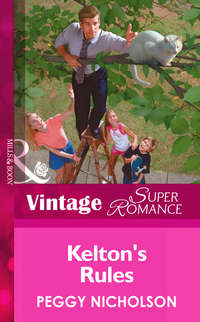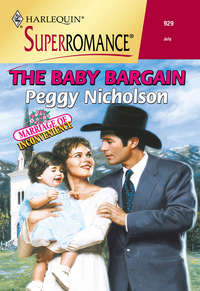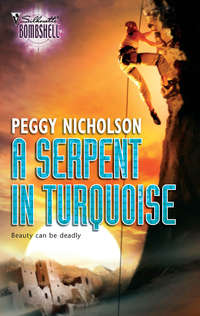
Полная версия
More Than A Cowboy
“But?” Tess fingered a black-tasseled ear. Yes, she could see how someone could fall in love with the idea of owning a lynx.
“But since people just keep on buying and trying, seventy or eighty of these animals come up for adoption each year in this country. Every last zoo is full to overflowing—they don’t need another lynx. The big cat sanctuaries are desperate for operating funds and cage space. They can’t afford to take on more pets-gone-bad. If the pound dares to place a lynx, then it just comes bouncing back again, once the new family gives up. So…” The vet shrugged, turned away, washed her hands at the sink.
“So?” Tess wondered.
“So when the owners run out of options, they dump the animal in some forest and try to tell themselves a cat that’s lived all its life in a cage or indoors will learn how to hunt before it starves. Or if they’re responsible, they put the poor beast down. Or suddenly the wife is wearing a fancy coat and a sheepish grin. But any way you cut it, there’s no happy ending. Which brings me to you.”
Tess jumped as the vet swung to aim an accusing finger at her.
“Assuming she lives, what do you mean to do with her?”
“I…haven’t thought it out, very far. This wasn’t something I planned. Zelda just happened.”
“Start thinking.”
“Well…I live on a ranch north of Trueheart, Colorado. At least, that’s where I’ll be living this summer, while I finish writing my dissertation. I suppose I figured I could free her there, maybe, and set up a feeding station outside. And hope that eventually she learns to hunt.”
Though she’d have to do this secretly. The cattlemen of Colorado were up in arms about the recent reintroduction of lynx to the San Juan Mountains. Tess’s father had been one of the main financiers of the lawsuits that had tried and failed to block the Division of Wildlife from bringing the animals back to the state. And when Ben Tankersly drew a line in the sand, his ranch manager and all his cowboys stepped up and toed it, if they valued their jobs. So Zelda would find no welcome at Suntop.
“Well, Problem One. If you’re talking about one of those suburban excuses for a ranch—a ten-acre ranchette—forget it. Lynx are territorial, but they need a range of five to a hundred square miles. You’ve got a female, so figure on the smaller side of that, but all the same. Have you got that kind of room?”
“More than enough.” Suntop was larger than Ted Turner’s ranch, larger than Forbes’s. Back in the 1890s, Tess’s great-great-grandfather had carved his vast spread out of the foothills of the San Juans, and Tankerslys had guarded it jealously ever since. Now Ben ruled there, king of his own small kingdom.
“I live at Suntop,” Tess admitted. When pressed to say anything at all, she generally put it like that. Strangers tended to assume she worked on the ranch rather than that she was a member of the family. She hated the way people looked at her when they learned she was a Tankersly. As if they were calculating her worth to the penny. And once they started adding it up, she was too proud to explain that she might be land rich, but she was cash poor. And likely would always remain so, if she wanted to live life her way.
So it was best just to disclaim or downplay all connection with Suntop, whenever possible.
“Suntop!” Liza Waltz let out a long, low whistle.
“Yeah, that should be room enough, but here’s Problem Two. Lynx hunt at six thousand to nine thousand feet. Is the ranch that high?”
“Not the home range,” Tess admitted. “But the summer grazing, up in the high country, borders on that kind of elevation. Then north of that is all national forest, the San Juans, hundreds and hundreds of square miles of wilderness, going up and up.”
“That would do. That’s not far from the area the Division of Wildlife chose for its lynx restoration program. Which brings me to another point.” The vet paused for a minute while she set up an IV bag on a pole, then taped Zelda’s left forepaw to an immobilization board. “You’re sure Hazeltine purchased her from a fur farm?”
“Yes. I insisted he give me all her papers, and they prove it.”
Liza grunted as she inserted the needle in a vein, nodded in satisfaction, then hooked up the tubing. “I’ll need to check those. The reason I ask is, if by any chance Hazeltine lied—if he trapped himself one of the Colorado DOW’s lynx—we’ve got to hand her over. They’re protected by the Endangered Species Act, state and federal, and believe me, we don’t want to mess with those guys!”
“No, but I’m certain her papers are in order.”
“I’ll have to call that fur farm to confirm it, because the DOW’s imported one hundred twenty-nine lynx into Colorado over the past four years, and do you know how many of them are left?”
“I haven’t really followed it lately. I know the program hasn’t gone as well as they’d hoped.”
Liza snorted. “The numbers have dwindled down to forty-seven cats, which can still be tracked by their radio collars. If Zelda isn’t one of the missing lynx, then where the heck are they?”
BY THE TIME Gabe returned with their take-out supper, Adam had managed to gimp his way to the picnic table on the screen porch. The evening breeze was mild for April, but not cool enough to dry the sweat he’d broken getting on his feet. He wiped a wrist across his forehead and called, “I’m out here,” when Gabe came through the kitchen door bearing grease-spattered brown paper bags.
“Geez, I turn my back for ten minutes and you’re out of bed!”
“Barbecue ribs and clean sheets are an ugly mix. Besides which, I was bored.” When Adam had insisted on signing himself out against his doctor’s advice, Gabe had decided to extend his visit and see him settled at home. But three days of devoted nursing and nagging was getting on both men’s nerves. It was just as well Gabe was headed back to Colorado tomorrow.
Adam sighed at the thought. “Wish I was headed west. Spring skiing, instead of swatting mosquitoes.”
“Then come with me,” Gabe suggested, as he tossed napkins and a bottle opener on the table. He ducked back into Adam’s pocket kitchen for plates and silverware. “Plenty of room at the home ranch, and you know Mom would love to pamper you. Since the twins went off to college, she’s got too much time on her hands. She’s been wallpapering everything but the border collies, and bugging Dad to take tango lessons. A mission to whip you back into shape is just what she needs.”
Adam grinned, shook his head and, popping a cap off a Negra Modelo beer, handed it over. “Thanks, but no thanks. Connie’s overwhelming enough when a man can run, but right now, while I’m feeble… First thing your mother would do, is start matchmaking.”
Gabe clinked his bottle against Adam’s in a rueful salute. “Too true. She couldn’t believe, when I called them yesterday, that you don’t have a steady girlfriend to take over once I’m gone.” His voice rose an octave and turned fretful. “A pussycat like Adam? Are those Louisiana women all blind and crazy?”
“Plenty of foxes in these woods, but they’re all marriage-minded, even the ones who swear they aren’t. So me, I’m taking a much-deserved sabbatical. Sleep this month, chase women later.” Adam took another swallow of beer. “Unless you still want help with your missing lynx problem?” Gabe hadn’t said a word about it after his first visit to the hospital.
His cousin’s brows drew together above a sticky red curve of sparerib. He set the bone aside to wipe sauce off his mouth. “I’m thinking maybe I was a bit hasty, suggesting that. Seems like you’re going to need a long, relaxing recuperation, and we’re racing the clock here.”
“They’re disappearing that fast?”
“Roughly four a month since January.”
They gnawed for a while in meditative silence till Adam said, “You sure you’ve got a problem? I mean, one of outside interference. You had more than average snowfall this year, didn’t you? So maybe they froze to death. Or they couldn’t find game in all that snow. You’ll find their bodies come snowmelt.”
Gabe shook his shaggy blond head. “They’re all wearing radio collars, which transmit to both satellites and planes, when we do flyovers. And each collar has a kill switch. If the animal stops moving for four hours or more, the collar sends out a death signal. Then we try to get somebody out there pronto, because sometimes not moving means the lynx is injured or trapped and we could help it.
“But of the cats that have vanished since January, all of their collars simply stopped sending. No live signal, no dead signal. Just…silence.”
Adam reached for the salt shaker. Reached an inch too far—a burst of sizzling fire streaked across his chest. He paused, blinking, then drew his hand back. Sat, testing each breath for a minute, then said casually, “Would you pick up the signal if the cat was down in a canyon, or holed up in a cave?”
Gabe lifted the shaker, used it, then set it down six inches closer to Adam. “You wouldn’t. The signal’s strictly line of sight. But when he came out, the satellite should pick him up again.”
“Well, maybe there was a cat convention at some point, in a cave. A St. Paddy’s Day blow-out or a Valentine howl-along? And an avalanche wiped out the whole tribe at once?”
Gabe grinned. “’Fraid not. Lynx are notoriously antisocial. They hunt and live alone. In mating season, March through early April, they keep company for maybe a week, but that’s it.”
“Except for mamas with kittens, I suppose.”
“Right, but since we haven’t had a single female deliver a litter in four years of hoping and waiting and praying, that isn’t an issue, either.”
“Hmm.” Adam served himself a second helping of potato salad. “What if they decided they missed Alaska or Canada or wherever they originally were snatched from and just started walking? ‘The cat came back,’ as the song goes.”
“Yeah, that was our first theory. A few from every group we’ve imported have gone walkabout, ending up in Utah, or New Mexico or even Nebraska. The males in particular can get restless. It isn’t unheard of for a tom to travel fifty miles or more a day for a week, though generally they do that in mating season, looking for ladies. But the satellite searches a wide band. If one of ’em made it to Las Vegas or Laramie, the collar signal would still beam up their location.”
“And it hasn’t,” Adam murmured to himself. “The case of the missing lynx. So…” He cocked a brow at his cousin. “Who’s got a grudge against these furballs?”
“Try the Cattlemen’s Association and every sheep-herder in the state, for starters.”
“Lynx kill cows? I didn’t think they were that big.”
“A big one tips the scales at forty pounds, and they’d eat nothing but snowshoe hares, if they had their druthers. When hares are scarce on the ground, they take pine squirrels or mice or the occasional ptarmigan. I guess a real bruiser might jump a sheep or two a winter, if he were desperate. But this isn’t like the wolf packs up in Yellowstone. You could drop a thousand lynx into cow country and never know the difference. They’re shy and elusive and they hunt by night. Short of some caterwauling in mating season, you’d never know they were there.”
“So why the fuss? I seem to remember some lawsuits, a few years back, trying to stop your program before it started.”
“Politics. In 2000, lynx were finally listed as threatened under the Endangered Species Act. And that means, whether the feds want to or not, they’re compelled by law to protect lynx habitat. And that’s where the rubber meets the road.
“The grazers fear that their grazing allotments will be taken away so the cats can hunt in peace. The loggers are scared that they won’t be able to cut trees in lynx territory. The Outfitters’ Association is worried they won’t be allowed to guide big-game hunters where the animals prowl.
“And the ski resorts, well, you remember the rumpus between the environmentalists and Vail resorts when they wanted to expand their ski runs into the Super Bowl area—the last place where native lynx were spotted in Colorado? Remember the Earth Liberation Front burned down twelve million dollars’ worth of ski lodges to protest the plan?”
Adam gave a lawman’s grunt of disgust.
“Bringing lynx back to the state has pretty well stopped ski development cold. Till the DOW can determine just how much habitat lynx need, and where they need it, we can’t allow any more development in the high country.”
“So they’re popular cats,” Adam said wryly. “No wonder they’re disappearing. Any cowboy with a rifle…”
“Who’s willing to risk a one-hundred-thousand-dollar federal fine and a prison term for killing an endangered species,” Gabe reminded him. “And sooner or later, word always gets out. Very few people have the nerve.”
“Yet your cats are vanishing, four a month. That sounds like something a little more…methodical than a trigger-happy cowboy. Got any theories who it might be?”
“Nope, but I’ve got a theory how he’s doing it.” Gabe opened a second beer for each of them. “Somebody’s using our own radio collars to hunt them down.”
“You can get the equipment to do that?”
“Yep. Buy the tracking antennas and earphones right off the Internet.”
Adam whistled softly. “Clever! And cold.”
“It’s just a notion of mine, nothing the Division has officially considered. But that’s when I thought of you. Investigating is what you do. And you’ve got a cover you could use.”
“Line-camp cowboy,” Adam mused. Three years ago, after Alice left him, he’d seriously considered quitting police work. While he’d searched his heart, he’d spent a summer cowboying in the high country north of True-heart, Colorado. “That would allow me to fit in up there, move around some. Are you losing lynx in that area?”
“That’s just about Ground Zero, or close enough. But the herds head up the trail about seven weeks from now and…” Gabe glanced at the crutches leaning against the wall. “I hadn’t realized, when I first spoke, how badly you were…”
A useful summer in the mountains, rather than stewing and fuming around here, till some doctor cleared him for duty? “Count me in, Gabe. Seven weeks from now I’ll be ready to sit a horse.”
CHAPTER THREE
LARSON NEVER chose the same place twice for their meetings, but he always picked the same kind of bar, Natwig noted grimly. Ferns and mirrors. Chrome and marble. Micro-brewery beers at eight bucks a pop, and watch the bartender smirk if you asked for a Budweiser on tap.
The clients would be all ski and city types, glossy and blow-dried, with not a care in the world. Those with high-altitude tans had gotten them on the slopes at Telluride and Crested Butte, not packing mules into back-country canyons, or crouching still as a lichen-covered slab of granite, hour after hour, waiting for a line of elk to cross a ridge and step into range.
Natwig’s restless gaze touched the mirror behind the bar, where a weathered, squint-eyed face stared blankly back at him. What’s wrong with this picture? It was he who was out of place here, standing out like a crow on a snowfield. If any of his friends should see him here, they’d know something stunk.
But then, no man he respected would set foot in a place like this. So maybe Larson wasn’t dumb in his choices, after all. Still. Let’s get a move on, dammit! Natwig finished his beer, smacked the bottle down on the polished mahogany and stood.
The drill was, he was supposed to wait till Larson showed, then follow him out to the parking lot. But down at the far end of the room, Larson was dawdling over his second margarita while he flirted with a giggly blonde who kept tossing her curls, showing off a glittery pair of diamond earrings.
Karen always wore a pair of turquoise studs that Natwig had bought her their last year in high school. Wonder if she’d like something like those sparklers?
The way he was going, he’d never find out. Every dollar he earned from this job would go to paying her medical bills and hanging on to the ranch. He shoved out through the door into frosty night air and drew a grateful breath. Too much perfume and aftershave and air freshener back there. What the hell am I doing?
What had to be done.
Arms folded against the cold, he slouched against the door of his pickup. When Larson finally sauntered out, Natwig unlocked his door. He scooped the paper bag off the floorboards, then strode across the parking lot to Larson’s Porsche—not even a year old, with not a speck of mud to mar its gleaming curves. The passenger door swung open as he approached, and he ducked inside. Set the bag between them.
“How many?” Larson’s manicured fingers reached for the parcel.
“Two.” He watched with contempt as the city man pulled out the collars, counting for himself. Didn’t he know better than to doubt a man’s word? Or realize what that kind of distrust said about the worth of his own word?
“Why only two?” Larson inspected the crushed transmitter on each collar, then dropped them back in the bag.
“Like I told you last month. It’s harder tracking lynx this time of year. Most of the snow’s melted, and what’s left is too crusty to take a print.” And the one shot he’d got at the big male north of Creede, after three days of hard stalking, he’d missed. But that failure he’d keep to himself.
“My…clients…won’t be pleased.”
“If your friends reckon they can do better themselves, tell them they’re welcome to try.”
And just who were Larson’s clients? People smart enough to want a cut-out, a middleman, separating themselves from their dirty work. People with deep pockets, to pay the kind of bounty Natwig was collecting.
The Cattlemen’s Association could raise that kind of cash. Or the ski developers. Or the timber industry, easy.
The goat-and sheepherders? Somehow Natwig didn’t see it. And as a member of the Outfitters’ Association himself, he’d heard nothing but the usual bellyaching at their annual gathering. No plan of action to fix the situation, and if there had been, they wouldn’t have needed to farm the job out.
“They’ll expect better next month.” Larson pulled out his wallet, and peeled off twenty bills from a fat wad.
As each thousand-dollar bill was laid upon his palm, Natwig felt the pressure in his chest ease the tiniest bit. Twenty thousand. Before Karen had broken her back, he’d have called that a fortune. A family with a man who could put meat on the table could scrape through a year on twenty grand.
As long as everyone stayed healthy. But now…
“And here are your latest locations.” Larson passed over a folded paper.
Imagine a world where a satellite a hundred miles overhead could pinpoint the whereabouts of those soft-stepping ghosts of the forest to fifty yards or less?
Imagine a world where somebody hired to protect all wildlife could be bribed to secretly access the DOW computers, then print out their animals’ latest locations, and pass them on to their enemies?
Not my kind of world.
Except he was trapped in it, sure as a lion up a tree. He could snarl all he wanted, but he was under the gun.
“Don’t expect too much next month. Lynx tend to travel in the spring,” he warned Larson as he gripped the door handle, eager to be out and away. “They’ll be searching for mates, looking for fresh hunting grounds.” He’d tried a couple of times to explain that just because the satellite pinpointed each cat one day per week, that didn’t mean the lynx would then sit tamely waiting till he came hunting.
If these locations were stolen from the computer yesterday, why, by today, every one of these forty-seven cats could be fifty miles to hell and gone across the mountains. Larson’s paper only gave him the place to start looking, no guarantee of finding.
But something about all this high-tech bullshit seemed to make a man arrogant, brash as the dumbest horse in blinders. If a computer said it was so—why then, it must be so. Nothing to it. Just reach out and shoot someone.
As Natwig shoved open the door and stepped out into clean air, Larson leaned over to give him a bland farewell smile. “My clients expect better.”
THEY’D RENDEZVOUSED outside of Trueheart at midnight, then Liza in her Jeep, with its caged rear end, had followed Tess’s pickup, towing its tandem horse trailer, north. Toward the high country.
A horseman could have ridden a straighter and shorter route to the summer range up through Suntop land. But constrained to travel by vehicle—and in secret—they had to circumnavigate the ranch. Their route wound up through the mountain valleys to the east, then spiraled north, then west, then finally south again.
Sixty slow-going miles of road dwindled from public two-lane to frost-heaved one-lane to muddy Forest Service and logging tracks. The scent of pine and snow blew through Tess’s open window. The jewelled eyes of deer gleamed in her headlights, then their graceful silhouettes bounded across the road and into the trees.
“Coming home,” Tess half sang aloud, as if the lynx in the car behind could hear her. “Hang on just a little longer, baby.” Liza had sedated the cat lightly for the drive, but she hadn’t dared give her more, since Zelda would have to be knocked all the way out for the final leg of her journey.
It was two hours before dawn when they reached the trailhead east of Sumner Mountain and parked. Just a whisper of cold wind stirring the pines. Stars so big and bright you could pick out colors by their light. “How is she?” Tess asked as she joined Liza at the back of her Jeep.
“Not happy.” The vet dropped the tailgate to reveal the caged interior, and a low feline moan seconded that opinion.
“But she looks good,” insisted Tess, while Liza inspected the lynx by flashlight. “She looks wonderful!”
Once the cat had recovered from pneumonia, Liza had moved her to a large kennel behind her house, west of Santa Fe. Seven weeks of intensive feeding had worked a miracle. Zelda’s ribs were no longer visible beneath her glossy coat and, even sedated, she seemed bursting with energy.
“Oh, she’s spunky enough,” Liza said broodingly, “but I’d still like her to gain more weight. A lot of her bulk is just that fabulous coat.”
“But you said she’s ready for freedom,” Tess worried. They’d discussed this at length.
“Given our schedule, I guess she’s got to be.”
They didn’t dare wait longer. Last week had seen spring roundup at Suntop and all the surrounding ranches near Trueheart. Now that the new calves were branded, within a week or two, the herds would be driven north to their summer range.
Liza and Tess had agreed that it was best if Zelda were acclimated and freed before the cattle arrived in the foothills. Lynx were shy and wary at the best of times. Commotion in the area while Zelda was choosing a den and a territory, might persuade her to seek these elsewhere.
But it was crucial to their plan that Zelda stick around, close to where Tess could feed her, till she’d learned to hunt her own food.
And so this rush to get her settled and happy and accustomed to being fed in a certain place at a certain time before the herds arrived. Cats were conservative creatures who liked dependable rituals, Liza maintained. The fewer surprises, the better.
“Will you tranq her now?” Tess asked the vet.
“Not till you’re ready to ride. You don’t want her waking somewhere along the way.”
“Better believe it! I don’t know who’d enjoy that more—me, Cannonball or Zelda.” Tess had picked the steadiest horse on Suntop to carry the lynx, and a pack horse that was nearly as sensible. Still, she found her nerves were skittering as she tightened the girths on both saddles, bridled up, then fitted her various packs and bundles into place. Steady or not, she could just imagine how Cannonball would react to a yowling, struggling cat in a basket strapped to his back—her own private rodeo, in the midst of dense forest, or on a cliffside trail!
Liza supported one-half of the collapsible metal cage while Tess lashed it to the right side of the pack mare’s saddle. A second four-foot-by-four-foot stack of steel-mesh squares was hung from the left side to balance the load. The mare snorted and rolled her eyes. “How far is it to your site?” Liza dithered. “You’re sure you can you find it in the dark?”








